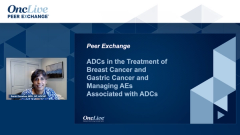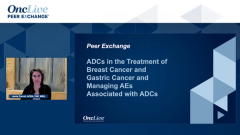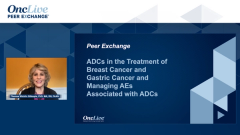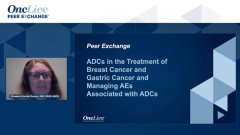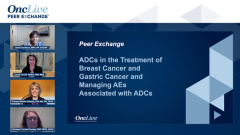
T-DXd in HER2+ Gastric Cancer: Managing Neutropenia and Other AEs
Focused discussion on the management of antibody drug conjugate–related adverse events in gastric cancer, with a focus on neutropenia.
Episodes in this series

Transcript:
Sarah Donahue, MPH, NP, AOCNP: How common is neutropenia in patients with gastric cancer receiving T-DXd [trastuzumab deruxtecan], Theresa? I think you told us it was very common, but how common, really, is it? Which patients are at risk and are you more worried about?
Theresa Wicklin Gillespie, PhD, MA, RN, FAAN: As I mentioned, myelosuppression across the board is rather common. In the DESTINY-Gastric01 trial, which was done in Asia, those patients had really high rates of neutropenia, around 70% or 71% of all grades, and about 58% of grade 3, so that’s pretty significant. And close to 5% had febrile neutropenia. In subsequent studies, those numbers are less, and we don’t see quite that many in our own practice. But there are some risk factors that we do need to keep in mind, and when we talk about gastric cancer, these definitely tend to apply.
One factor would be age, and as I mentioned previously, in gastric cancer, most of these patients are older; you don’t see a lot of 40-year-olds with gastric cancer. So, age is already a risk factor overall with gastric cancer. The kind of gastric cancer they’re having is also associated with it, as well as previous therapies that they might have had that perhaps left their bone marrow a little beat up from previous regimens. But the other things are comorbidities. There are lots of comorbid conditions, including obesity, diabetes, congestive heart failure, COPD [chronic obstructive pulmonary disease], rheumatoid arthritis or osteoarthritis, as well as HIV. All of those are considered risk factors for neutropenia. Like with other systemic therapies that also have the risk of neutropenia, you want to make sure you’re educating the patients. And of course, we’re monitoring their CBC [complete blood count] and ANC [absolute neutrophil count] regularly.
Jamie Carroll, APRN, CNP, MSN: To add to what Theresa was saying, in breast cancer, just over 40 patients have any grade neutropenia with T-DXd, or trastuzumab deruxtecan. I would agree that many patients are at risk, including what Theresa was saying, and then in addition, I think patients who have known bone marrow involvement, they’re at increased risk for neutropenia or myelosuppression from treatment.
Sarah Donahue, MPH, NP, AOCNP: They might be the patients you’re getting white blood cell, your G-CSF [granulocyte colony-stimulating factor] ordered for. And in this case, since this medication is given once every 3 weeks, you could consider something longer acting. What choice are you using for your white blood cell support? Maybe Theresa can answer first, as far as what sort of treatment do you usually use?
Theresa Wicklin Gillespie, PhD, MA, RN, FAAN: That’s a bit of physician’s choice, so I can’t say we have a strict policy on that. And we don’t usually see a lot of patients who have marrow involvement with gastric cancer. Liz may see it in her own practice, but that’s not normally something we would see a lot.
Elizabeth Prechtel Dunphy, DNP, CRNP, AOCN: We haven’t seen a terrible amount of this either in our practice, so we haven’t had the instance where we have had to use growth-factor support, but I imagine if that were to be the case, again, as Theresa said, that’s a physician choice. I would think that they would use a long-acting growth-support factor, but we haven’t had that incidence yet.
Sarah Donahue, MPH, NP, AOCNP: Are there any parameters that are considered in a patient with metastatic gastric cancer who is started on trastuzumab deruxtecan, to reduce the risk of neutropenia? Is there anything we can do prior to prevent it?
Elizabeth Prechtel Dunphy, DNP, CRNP, AOCN: I don’t know if there’s anything we can do prior to prevent it, except that we have good monitoring. We consider those risk factors that Theresa mentioned when we’re looking at our patients, and how heavily pretreated they are. So we’re maybe getting a sense of how compromised their bone marrow is, and keeping those facts in mind when prescribing this for a patient. And the education comes in, with not only the patient but their caregiver, to make sure they know when to call the provider should they start feeling unwell or develop a temperature or other signs and symptoms of infection.
Theresa Wicklin Gillespie, PhD, MA, RN, FAAN: To piggyback on what Jamie said earlier, about how patients may be reluctant to report certain symptoms, I guess you could say the good thing about neutropenia is that there’s a laboratory test, so it’s not like they can pretend that, “Oh, I don’t have an ANC of 600” or whatever. But they do have to be educated and have it reinforced in terms of if they develop a fever or any other signs or symptoms of an infection.
As I mentioned, these patients can be quite ill, and so they may have a lot going on with them, and something that could be homed-in on if you don’t have a lot of other symptoms you’re dealing with. That may be overlooked when you’re dealing with some of the problems that our patients with gastric cancer have. So, think about some of the surgeries they have had and the nutritional consequences of that, trying to get enough nutrition, particularly if they’ve had significant surgery or a total gastrectomy, for example. A lot of times their focus is on the day-to-day. “How many calories am I getting in in a day?” Or “how am I going to be feeling and quality of life?” So, you have to make sure you’re reinforcing every time, maybe sounding like a broken record, but to make sure they’re hearing that, and their caregivers and family members are hearing that, too. We try to emphasize this is not something we mess around with. This is something that is really important, that you report that, and report it at the earliest time that it’s observed.
Sarah Donahue, MPH, NP, AOCNP: Are you seeing similar patients on docetaxel, carboplatin regimens, or on your doxorubicin, cyclophosphamide regimens, where when they become neutropenic, they’re having oral sores, on trastuzumab deruxtecan? I haven’t had that experience with this medication in patients with breast cancer myself, so just curious.
Theresa Wicklin Gillespie, PhD, MA, RN, FAAN: You mean like mucositis?No, that has not been a prominent problem. Liz?
Elizabeth Prechtel Dunphy, DNP, CRNP, AOCN: No, it hasn’t in our practice either.
Sarah Donahue, MPH, NP, AOCNP: For patients with breast cancer on trastuzumab deruxtecan, I think we counsel patients similarly, Jamie, do you agree, as far as neutropenia goes?
Jamie Carroll, APRN, CNP, MSN: I agree. I think this is one area where COVID-19 has helped. Because prior to COVID-19, if someone was wearing a mask out in public, everyone would look at them, but now that’s a common thing. So, if you are neutropenic and we’re worried about the development of neutropenic fever or dose delays, holds, anything like that, patients can wear a mask out in public. I counsel them not to kiss or hug someone with a known infection. Then if you’re going to be inside in a crowded area, it might not be a bad idea to wear a mask.
I am really all about quality of life, though, so when patients ask me about neutropenia, and we know they’re going to be neutropenic maybe from day 7 to 11 in a cycle, they say, “Should I stay home? Should I not go anywhere?” And for me, it’s really about quality of life. I don’t want them to be fearful of living their life. They have a metastatic diagnosis, and although we hope that with metastatic breast cancer they are alive for several years, I don’t want those years to be low quality because they’re fearful of leaving their home, because of development of infection, or because they’re neutropenic. I try to strive for them to go out and do the things that bring them joy, the things that they like to do. That’s part of what I counsel when we’re discussing the adverse effects of treatment.
Transcript edited for clarity.
Newsletter
Knowledge is power. Don’t miss the most recent breakthroughs in cancer care.

